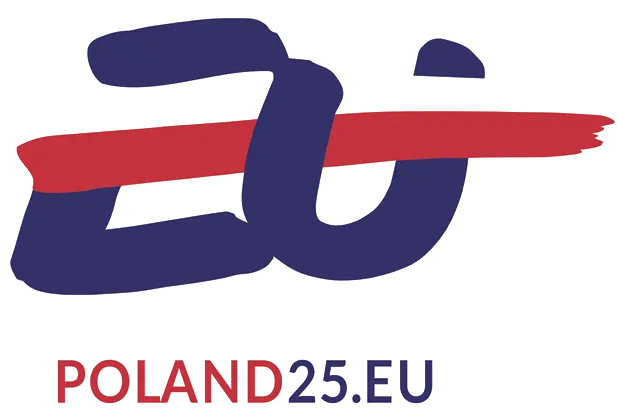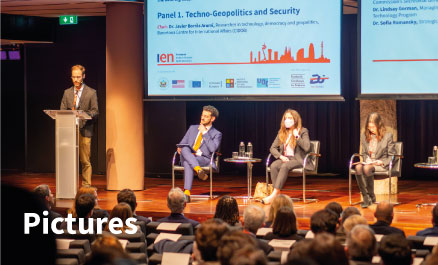4th US & EU Barcelona Meeting
2025. A Tech Alliance for Europe and the United States: The Next Big Leap?
February, 27th – 4.30 – 8.00 pm
Auditori de La Pedrera, Passeig de Gràcia, 92, 08008 Barcelona
US & EU Barcelona Meeting 2025: Artificial intelligence and geopolitics in the new technological era
On 27 February, the iconic Pedrera building in Barcelona hosted the US & EU Barcelona Meeting 2025. A Tech Alliance for Europe and the United States: The Next Big Leap? Now in its fourth year, it has garnered a reputation as a key space for the analysis of transatlantic cooperation in a context of political, technological and social change. Organized jointly by the Institute of North American Studies (IEN), and in collaboration with the United States Consulate General, the European Commission, IBEI, Universitat Oberta de Catalunya (UOC) and the Pedrera Foundation, the event brought together leading experts in technology, economics and geopolitics to discuss challenges and opportunities in the relationship between the United States and the European Union in a context of increasing global competition.
The President of the Institute of North American Studies, Mr Joan F. Corona, opened the session by highlighting the importance of the event as a space for reflection on the transatlantic relationship and the role of Barcelona as a hub of strategic thinking about the United States. “Our goal is to make Barcelona a European meeting point for reflection on the US and the transatlantic relationship in the 21st century,” said Corona, who expressed his gratitude to the attendees and highlighted the track record of the IEN, emphasizing its mission to foster dialogue between Europe and the US.
Ms Lia Miller, U.S. Consul General in Barcelona, reinforced this vision, pointing out that AI is not only a tool for digital transformation, but a key factor in contemporary geopolitics. “Artificial intelligence is not just a technological frontier, it is a geopolitical frontier. Its development, regulation and use will define the balance of power in the coming decades.” Miller stressed that the US is pursuing an innovation-driven approach without excessive barriers, which contrasts with the EU’s regulatory approach. “We believe in AI that empowers workers, not replaces them; that reinforces free societies, and does not restrict discourse,” she said.
In his presentation, Mr Manuel Szapiro, Director of the European Commission Representation in Barcelona, argued that: “How we manage our relationship with China will shape the geopolitics of the 21st century. We cannot allow ourselves to be mere spectators in a competition where others are defining the rules of the game.” Despite the challenges, cooperation in strategic sectors such as semiconductors, AI and defence is key to preventing third parties from imposing their own rules of the game in the global technological sphere.
Finally, the Consul General of the Republic of Poland in Barcelona, Ms Ilona Kaldonska, stressed that the Polish presidency of the EU Council comes at a time of great uncertainty, marked by Russian aggression in Ukraine and an increase in hybrid attacks against Europe. She emphasized the need to strengthen cybersecurity and move towards a common digital market with strategic investment in artificial intelligence. She also stressed that the EU must ensure its technological autonomy without depending on third countries, concluding that “we are witnessing an increase in geopolitical tensions and hybrid attacks targeting European democracy and security.”
First panel: Techno-geopolitics and Security
The war in Ukraine and the rise of China have highlighted the risks of disruptive technologies, traditionally for civilian use, in the field of security. Before 2022, the Western powers balanced the acquisition of these technologies against the need to restrict their adversaries’ access to them, without fully prioritizing security. However, the conflict in Ukraine has served as a laboratory for the military applications of AI, while its use in disinformation campaigns undermines democracy. Faced with this new scenario, the US and the EU face increasing pressure to incorporate these risks in their policies for R&D investment, regulation, export controls and defence procurement.
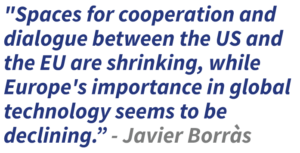 The moderator, Mr Javier Borràs Arumí, a researcher in technology, democracy and geopolitics at the Barcelona Centre for International Affairs (CIDOB), introduced the panel on techno-geopolitics and security, contextualizing the growing gap between the US and the EU in technological matters and highlighting the tensions arising from digital regulation and competition with China. “Spaces for cooperation and dialogue between the US and the EU are shrinking, while Europe’s importance in global technology seems to be declining. We are at a critical point, where the decisions we make today will define our role in the technological geopolitics of the future.” That is to say, the growing tensions between the US and the EU, along with Europe’s diminishing role in technological advancements, could significantly impact its geopolitical standing. The choices made now will determine how Europe positions itself in the future global technological race.
The moderator, Mr Javier Borràs Arumí, a researcher in technology, democracy and geopolitics at the Barcelona Centre for International Affairs (CIDOB), introduced the panel on techno-geopolitics and security, contextualizing the growing gap between the US and the EU in technological matters and highlighting the tensions arising from digital regulation and competition with China. “Spaces for cooperation and dialogue between the US and the EU are shrinking, while Europe’s importance in global technology seems to be declining. We are at a critical point, where the decisions we make today will define our role in the technological geopolitics of the future.” That is to say, the growing tensions between the US and the EU, along with Europe’s diminishing role in technological advancements, could significantly impact its geopolitical standing. The choices made now will determine how Europe positions itself in the future global technological race.
To address these types of questions, we were joined by three distinguished speakers.
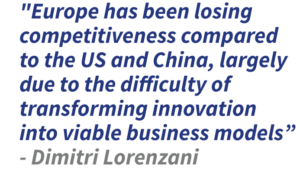 The first speaker was Mr Dimitri Lorenzani, a member of the European Commission’s Competitiveness team and visiting professor at the College of Europe in Bruges, who spoke about the divergence between the US and the EU in technological regulation. Lorenzani warned of the growing productivity gap between the two blocs, stressing that “Europe has been losing competitiveness compared to the US and China, largely due to the difficulty of transforming innovation into viable business models. Our challenge is to close this gap without compromising European security and values.” In other words, while the US and China have excelled in turning their innovations into economic power, Europe must find a way to keep up without sacrificing its commitment to security and fundamental values. The key lies in striking a balance between fostering innovation and ensuring that this progress does not undermine Europe’s social and ethical foundations.
The first speaker was Mr Dimitri Lorenzani, a member of the European Commission’s Competitiveness team and visiting professor at the College of Europe in Bruges, who spoke about the divergence between the US and the EU in technological regulation. Lorenzani warned of the growing productivity gap between the two blocs, stressing that “Europe has been losing competitiveness compared to the US and China, largely due to the difficulty of transforming innovation into viable business models. Our challenge is to close this gap without compromising European security and values.” In other words, while the US and China have excelled in turning their innovations into economic power, Europe must find a way to keep up without sacrificing its commitment to security and fundamental values. The key lies in striking a balance between fostering innovation and ensuring that this progress does not undermine Europe’s social and ethical foundations.
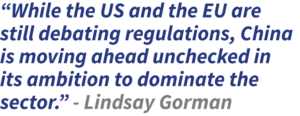 The next speaker was Ms Lindsay Gorman, Managing Director of the German Marshall Fund of the United States, who noted that “China has pursued a systematic strategy to lead the global technological revolution, investing in key sectors such as artificial intelligence, quantum computing and biotechnology.” She stressed that, while the US and the EU are still debating regulations, China is moving ahead unchecked in its ambition to dominate the sector.
The next speaker was Ms Lindsay Gorman, Managing Director of the German Marshall Fund of the United States, who noted that “China has pursued a systematic strategy to lead the global technological revolution, investing in key sectors such as artificial intelligence, quantum computing and biotechnology.” She stressed that, while the US and the EU are still debating regulations, China is moving ahead unchecked in its ambition to dominate the sector.
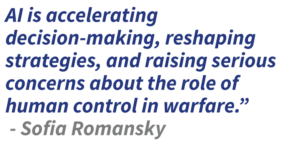 The third speaker, Ms Sofia Romansky, a strategic analyst at the Hague Centre for Strategic Studies, pointed out how AI is transforming modern warfare, with Ukraine serving as a testing ground for new military technologies. She explained that AI accelerates the OODA (“Observe, Orient, Decide, Act”) loop, increasing the speed of response in combat and redefining military strategy. She warned against delegating too much decision-making to autonomous systems with no human oversight. “The nature of war remains the same, but its character is changing. Speed and scale will be the determining factors in future conflicts, and AI is already proving it can completely redefine the dynamics of combat.” Essentially, while the fundamental nature of war remains unchanged, the way conflicts unfold is evolving rapidly—AI is accelerating decision-making, reshaping strategies, and raising serious concerns about the role of human control in warfare.
The third speaker, Ms Sofia Romansky, a strategic analyst at the Hague Centre for Strategic Studies, pointed out how AI is transforming modern warfare, with Ukraine serving as a testing ground for new military technologies. She explained that AI accelerates the OODA (“Observe, Orient, Decide, Act”) loop, increasing the speed of response in combat and redefining military strategy. She warned against delegating too much decision-making to autonomous systems with no human oversight. “The nature of war remains the same, but its character is changing. Speed and scale will be the determining factors in future conflicts, and AI is already proving it can completely redefine the dynamics of combat.” Essentially, while the fundamental nature of war remains unchanged, the way conflicts unfold is evolving rapidly—AI is accelerating decision-making, reshaping strategies, and raising serious concerns about the role of human control in warfare.
Second panel: Next-generation technologies: Economy, Trade and Regulation
This panel explored the economic, commercial, and regulatory challenges and opportunities of advanced technologies. The EU and US are seeking to lead global quantum development, but their cooperation faces obstacles due to policies that prioritize digital sovereignty, the protection of technological manufacturing, and national subsidies. In this context, the EU-US Trade and Technology Council and the Quantum Working Group must determine where they can work together and where divergences remain.
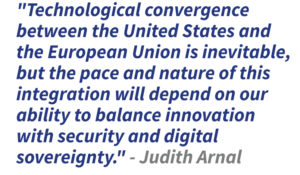 Ms Judith Arnal, senior research fellow at the Elcano Institute and moderator of the event, opened the discussion by stressing the complexity of the transatlantic relationship regarding technology and regulation. She emphasized that, although both blocs share democratic values, differences in their approaches to regulation can lead to friction in digital cooperation. “Technological convergence between the United States and the European Union is inevitable, but the pace and nature of this integration will depend on our ability to balance innovation with security and digital sovereignty.” In other words, while both blocs are bound to align their technological landscapes, the key challenge lies in ensuring that progress does not come at the expense of strategic autonomy, regulatory frameworks, or national security interests.
Ms Judith Arnal, senior research fellow at the Elcano Institute and moderator of the event, opened the discussion by stressing the complexity of the transatlantic relationship regarding technology and regulation. She emphasized that, although both blocs share democratic values, differences in their approaches to regulation can lead to friction in digital cooperation. “Technological convergence between the United States and the European Union is inevitable, but the pace and nature of this integration will depend on our ability to balance innovation with security and digital sovereignty.” In other words, while both blocs are bound to align their technological landscapes, the key challenge lies in ensuring that progress does not come at the expense of strategic autonomy, regulatory frameworks, or national security interests.
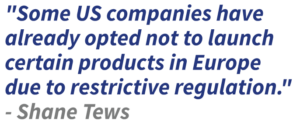 The first speaker, Ms Shane Tews, a researcher at the American Enterprise Institute, presented the North American perspective, pointing out that excessive regulation in Europe could stifle innovation. “While the US follows voluntary guidelines, the EU puts the emphasis on regulation. This could limit our ability to respond in a world where China is advancing without restrictions,” she said. Tews warned that some US companies have already opted not to launch certain products in Europe due to restrictive regulation.
The first speaker, Ms Shane Tews, a researcher at the American Enterprise Institute, presented the North American perspective, pointing out that excessive regulation in Europe could stifle innovation. “While the US follows voluntary guidelines, the EU puts the emphasis on regulation. This could limit our ability to respond in a world where China is advancing without restrictions,” she said. Tews warned that some US companies have already opted not to launch certain products in Europe due to restrictive regulation.
 The second speaker, Mr Szymon Zareba, head of the Global Issues Programme at the Polish Institute of International Affairs (PISM), pointed out that technological competition is more than just a matter of innovation, it has become a key factor in national security and strategic autonomy. The EU faces the challenge of regulating without slowing innovation, so as not to fall behind the US and China. While transatlantic cooperation is crucial, the growing emphasis on “digital sovereignty” and regulatory differences may make it more difficult. “Technology is no longer just a matter of economic progress, but a tool of geopolitical influence. Europe must decide whether it wants to be a major player or a mere spectator in this new era of strategic competition.” In this context, Europe’s ability to innovate and regulate effectively will be crucial in defining its role in the global landscape, where technological decisions are shaping the balance of power among major world powers.
The second speaker, Mr Szymon Zareba, head of the Global Issues Programme at the Polish Institute of International Affairs (PISM), pointed out that technological competition is more than just a matter of innovation, it has become a key factor in national security and strategic autonomy. The EU faces the challenge of regulating without slowing innovation, so as not to fall behind the US and China. While transatlantic cooperation is crucial, the growing emphasis on “digital sovereignty” and regulatory differences may make it more difficult. “Technology is no longer just a matter of economic progress, but a tool of geopolitical influence. Europe must decide whether it wants to be a major player or a mere spectator in this new era of strategic competition.” In this context, Europe’s ability to innovate and regulate effectively will be crucial in defining its role in the global landscape, where technological decisions are shaping the balance of power among major world powers.
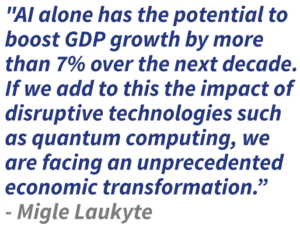 The third speaker, Ms Migle Laukyte, Associate Professor in AI and Law at Pompeu Fabra University, stressed the enormous economic impact of AI and quantum technologies, noting that their development can transform key sectors such as finance and advanced materials. She highlighted the tension between regulation and innovation, warning that different regulatory frameworks can hinder international cooperation and affect companies’ competitiveness. “AI alone has the potential to boost GDP growth by more than 7% over the next decade. If we add to this the impact of disruptive technologies such as quantum computing, we are facing an unprecedented economic transformation.” In this sense, AI and quantum computing are not just advancing individual industries but are set to fundamentally reshape entire sectors, driving economic growth in ways we have never seen before. These technologies will likely lead to new business models, enhance productivity, and create innovative solutions across a wide range of fields, from healthcare to finance, manufacturing, and beyond. Their full potential could redefine global economic dynamics and competitiveness.
The third speaker, Ms Migle Laukyte, Associate Professor in AI and Law at Pompeu Fabra University, stressed the enormous economic impact of AI and quantum technologies, noting that their development can transform key sectors such as finance and advanced materials. She highlighted the tension between regulation and innovation, warning that different regulatory frameworks can hinder international cooperation and affect companies’ competitiveness. “AI alone has the potential to boost GDP growth by more than 7% over the next decade. If we add to this the impact of disruptive technologies such as quantum computing, we are facing an unprecedented economic transformation.” In this sense, AI and quantum computing are not just advancing individual industries but are set to fundamentally reshape entire sectors, driving economic growth in ways we have never seen before. These technologies will likely lead to new business models, enhance productivity, and create innovative solutions across a wide range of fields, from healthcare to finance, manufacturing, and beyond. Their full potential could redefine global economic dynamics and competitiveness.
The final speaker was Mr Francesc Bracero, a journalist specializing in technology and AI from La Vanguardia, who explained how AI is transforming society at an unprecedented pace, with a profound impact on the global economy and security. He also stressed that modern conflicts are no longer limited to the physical battlefield, but are also fought in cyberspace: “AI is probably the most transformative technology we have and its evolution is so rapid that it poses unprecedented challenges in regulation, cybersecurity and data control.” This highlights how the rapid development of AI is outpacing current regulatory frameworks, raising concerns about privacy, security, and the potential for misuse. The speed at which AI evolves means that regulations and security measures need constant updates to address new risks, posing a unique challenge for governments and organizations alike.
16.00h
Registration for attendees
16.30h
Event introducción
Opening speakers
Dr. Joan F. Corona, President, Institute of North American Studies Foundation
Ms. Lia Miller, Consul General, Consulate General of the United States in Barcelona
Mr. Manuel Szapiro, Head of Representation in Barcelona, European Commission
Ms. Ilona Kaldonska, Consul General, Consulate General of the Republic of Poland in Barcelona
4.45pm Panel 1.
Techno-Geopolitics and Security
Russia’s war in Ukraine and China’s rise have put the spotlight on the security aspects of disruptive technologies that are otherwise widely utilized for civilian purposes. Although the dangers associated with Artificial Intelligence, for instance, have long been recognized, the absence of large-scale hostilities placed important limits on Transatlantic efforts to counter this emerging threat. For many years prior to 2022, Western policymakers were obliged to balance competing priorities: the perceived need to acquire this technology for the European and US security sectors, denying it to potential adversaries, whilst simultaneously accounting for strategic logic, civil society concerns, industrial capabilities, and the corporate bottom line. In these confused circumstances, security demands were often deprioritized. But as the security situation has evolved over the last several years of war, with the conflict in Ukraine serving as a laboratory where the military applications are visibly tested on live battlefields, and amidst constant use of AI technologies to undermine Western democracy and elections, EU and US officials have been under growing pressure to ensure the potential threats posed by new generation technologies are sufficiently accounted for in Western policies towards investing in research and development, technology regulation, export controls, and defense procurement. This panel will address the implications of this new situation for EU and US policymakers and explore possible pathways to promote cooperation and minimize areas of discord.
Speakers
Dimitri Lorenzani
Member of the Competitiveness Task Force in the European Commission’s Secretariat General and Visiting Professor at College of Europe, Brugge.
Lindsay Gorman
Managing Director and Senior Fellow at the German Marshall Fund’s Technology Program.
Sofia Romansky
Strategic Analyst, The Hague Centre for Strategic Studies
Chair
Javier Borràs Arumí
Researcher in technology, democracy and geopolitics, Barcelona Centre for International Affairs (CIDOB)
Questions & Answers
Coffee Break
6.20pm Panel 2.
Next generation technologies: Economy, Trade and Regulation
Shifting away from security problems, this panel focuses instead on the economic, trade and regulatory challenges and opportunities generated by these advance technologies. When it comes to the future of quantum technologies, for example, the EU and US are each striving to become the ‘quantum valley’ of the world. For both, new regulatory frameworks are gradually emerging, such as the EU’s Artificial Intelligence Act. But how can the EU and US cooperate, particularly at a time when political initiatives stressing ‘digital sovereignty’, protection of high-tech manufacturing and domestic subsidies seem to be emphasizing competition? On what issues can agreement be found, and on what issues is agreement unlikely? These are questions that policymakers EU-US Trade and Technology Council and the Quantum Task Force must wrestle with and seek solutions to. The experts convened on this panel will address the key problems EU and US policymakers are currently addressing and likely to be confronted with in the coming years and evaluate their prospects at overcoming these obstacles.
Speakers
Shane Tews
Nonresident Senior Fellow at the American Enterprise Institute
Szymon Zareba
Head of the Global Issues Programme, The Polish Institute of International Affairs (PISM)
Migle Laukyte
Associate professor in Artificial Intelligence and Law, Universitat Pompeu Fabra
Chair
Judith Arnal
Senior Analyst, Elcano Royal Institute
Questions & Answers
Closing Remarks
Francesc Bracero
Journalist, specialized in technology and artificial intelligence, La Vanguardia.
Academic advisor: Dr Jeffrey Michaels, IEN Senior Fellow in American Foreign Policy and International Security, Institut Barcelona d’Estudis Internacionals (IBEI)
Languages
Simultaneous interpretation will be included.
Communication
The media will be informed of expert visits.
The event will be streamed.
In collaboration with:
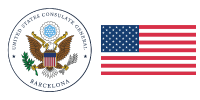



Supported by:

